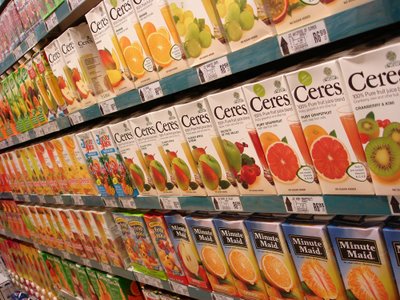
Is fruit juice for real?
by Nick van der Leek
Ever watched how quickly an uneaten apple or pear burns brown when its tender white flesh is exposed to the atmosphere? It’s called oxidation, and the same thing is happening to our bodies, and to all other fruits exposed to the atmosphere. It’s easily seen in bananas too, but less easily observed in oranges or grapes. But it’s happening. Like an old apple, older grapes and oranges in time, lose their integrity. Oranges become soggy and fall apart when they’re peeled. Grapes have natural preservatives, but they last only so long, and anyone who has kept grapes in the refrigerator for a few days finds that the last ones soon go gooey and crush easily when plucked.
Does it come as any surprise then that the vitamin content (vita means life) declines, the life carrying capacity diminishes the longer these juices are preserved and left on shelves in supermarkets?
Fruits and vegetables lose their integrity – their goodness – very quickly once they’ve been harvested. It ought to be common sense that the loss of freshness means a reduction in vitamin carrying capacity. But consumers are in the habit of preferring to buy juice. The carbohydrates they contain are really simple sugars. Mere nutritional stores like carbohydrates and proteins need to be distinguished as ordinary stores of liquid fuel. Sugary water is not very different.
If consumption is close to the time and place of harvesting, fruits are a great deal fresher and healthier than those that have been stored for longer periods. The various processes don’t help much. Perhaps produce is refrigerated, sometimes crushed or changed in some way so that the original juice or pulp becomes, in fact, an amalgam of chemicals and water, with the fruit making out just a stale card boarded statistic, an annotation of the total product.
I met a doctor in Thailand who told me that vitamin C cannot be stored. You can’t get it in multivitamins (and there is no proof that taking multivitamin tablets has any impact on the systems of healthy people). If you want Vitamin C you need to eat an orange (or Vitamin C carrying fruit) very quickly after cutting or peeling. Fruit juices, she said, are not a reservoir of Vitamin C, despite their labels. The idea of Vitamin C being a precious element both dependent and closely associated with living systems and living tissue is not reported by industry as fact, but it makes sense to me.
When processing fruit into juices, there might be a little vitamin C going in, but it atrophies over time until it has no more of its original vitality. If you find this hard to believe, place a juice and the actual fruit alongside one another. Put the fruit in a blender and drink it. Then drink the processed juice. You’ll notice the obvious vitality of the freshly squeezed stuff, and the absence of a grainy, soft aroma in the processed juice. This applies equally to juices that claim to be preservative free, sugar free and 100% juice. You’ll also notice that orange juice derived from squeezing oranges is actually orange. What you buy in supermarkets is called orange juice, but is actually yellow, and is often extremely sweet, sometimes at the threshold of sour, even when described as 100% orange juice. What you’re drinking is dead sap with lots of sugar, and perhaps some fruit extract that doubles as a natural preservative.
We ought to be eating fresh food. Fresh means no preservatives, colorants or additives in sight. Fresh food is grown locally. Or at least consuming liquids with a lower sugar content, like ice teas, and mineral water.
Once again, a useful way to imagine what happens to the goodness of juice inside their colorful carton packaging is to visualize an apple core, or our own bodies, when left to stagnate. It has been reported that produce that has been frozen tends to have higher nutritional quality compared to other produce (non-frozen) simply because the former was preserved closer to the point at which it stopped functioning as living tissue. Non frozen produce is better immediately after harvesting, but then quickly tends to attract bacteria and rots after a limited period of time
If you’re concerned about health, and eating a healthy diet, when it comes to fruit juice, rather buy the fruit and get the juice directly. The sugar content alone of commercial juice puts it on par with sodas. There is enough acid in some sodas and juices to dissolve human teeth in a few years, if consumed in large quantities. It’s not good for the body, and no animal on the planet consumes a diet as consistently concentrated (acidic) as the juices we drink.
If you have a sweet tooth, and are in the habit of drinking fruit juices, whether they’re 100% or not, add 25% water to the mix.
The best option is homegrown fruits and vegetables, or local produce – because these seldom need to be refrigerated when and where they are grown to meet local demand and demographics. If you have a nearby piece of land to work with, why not plant a few carrots, potatoes or tomatoes? We have a prickly pear tree in our garden, and I swear those fruits are the freshest and tastiest prickly pears I’ve ever tasted.
No comments:
Post a Comment